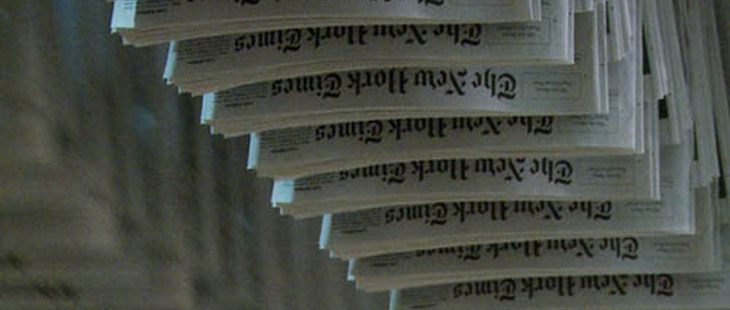

It was a big week in media.
The News International debacle is still unfolding, and Kai Nagata, the 24-year-old Quebec correspondent for CTV, quit and released a long letter describing how he’s lost faith in TV news. Our own Sun papers also this week released a photo of The Duchess of Cambridge’s butt cheek, with a lede that ran, “It wasn’t the royal honey ‘moon’ Canadians were expecting,” that also managed to spell her name two different ways and get the prince’s relationship to Edward VIII wrong.
It’s good, then, that it was also the week Page One was released. This documentary on 14 months in the life of the New York Times’ media desk, though not as effectively structured as it might be (I understand it was originally meant to be a profile of media columnist David Carr, who remains its star), is a good still point to try to make sense of all this.
We’re warned by Carr early in the film that it won’t be an especially critical look at the paper, when this formerly coke-addicted single father admits that he’s swallowed the grey pill of what he refers to as New York Times exceptionalism.
But it doesn’t have to be. The Times is one of the most criticized media operations in the world. From Chomsky to Norman Oder, the boundaries of this paper’s shortcomings, real and perceived, have been well laid out. Some, like Chomsky’s 1980s accusation that “history is what appears in the New York Times archive” are not quite as relevant now that the Library of Congress is preserving tweets and even the mainstream media has been splintered into a hundred thousand pieces. Others, like Oder’s accusations of conflict of interest in the Times coverage of its development partner’s business dealings in Brooklyn, seem more substantial.
But the picture we get in Page One is of a team of smart people with a great sense of their paper’s importance and their own responsibility, trying to do their best.
And though the peek the movie provides inside the meetings and offices and behind the desks is great for news junkies, this image of the Times is on full view every day on its pages and its website (and on the Huffington Post and Yahoo and any number of other aggregators and blogs, too, who rely on the big Times budget to put the meat in their sandwiches). The New York Times, and the Guardian, for another example, is what a good newspaper looks like these days. Not perfect, but good.
Read Australian papers, or the New Zealand Herald, or any number of British papers, whether they’re owned by Murdoch or not, and you’ll see what it looks like to fall short. You don’t need the extremity of the News of The World to see sensationalism being treated as cake rather than icing. Look at this evening’s Sydney Morning Herald, and you’ll see the lead story is about a mother (not a woman) who was hit by a car. The second story on the New Zealand Herald is about a girl killed in her mother’s car. The UK’s Daily Mirror website’s top story is about the Beckhams having named their new daughter Harper Seven. The Sun papers are Canada’s equivalents, spending most of their time and ink on the wrong side of the line that separates informing from pandering.
Though we all seem to be interested in dead and dying mothers and distressed (but preferably dead) kids, none of it’s news to anyone outside the families. The extent to which a paper relies on such stories is the extent to which they have fallen down on the job of being a newspaper.
Media was once primarily divided into conservative and liberal, or, pace Chomsky, corporate versus independent, and though those categories are still of use, the most important dichotomy these days is serious and not serious.
Serious papers can be entertaining papers—they in fact must be entertaining papers—but they also must, for instance, lean more heavily on news that has an effect on its readers or their understanding of their world than on news that simply excites. A serious paper will endeavour in all instances to report facts its own reporters have seen with their own eyes. A serious paper will have the confidence and organizational wherewithal to dig out a story rather than wait for circumstances or other agencies to flag it for them. A serious paper checks facts. A serious paper can go big with a picture of Will and Kate, but will recognize there is nothing much to say about events entirely controlled by publicists and devote their verbiage to, say, South Sudan. A serious paper will recognize the difference between sports (which mean little) and people’s reaction to them (which can mean a lot). A serious paper would, on principle, not bother to show up to prime ministerial press conferences that do not allow open questions.
The New York Times is, in almost every respect, a serious paper, in a way that Kai Nagata discovered TV news almost never is (which is why former News of the World and Daily Mirror editor Piers Morgan is such a fine fit to replace Larry King). As news gathering flourishes, through citizen journalism, aggregation and whatever else folks are doing out there, the specifics of seriousness are important to keep in mind, because they can come from some unusual places.
Oder’s reporting on the Atlantic Yards development in Brooklyn, and on the Times’ coverage of it, seems also quite serious, though you’d be forgiven for thinking the guy’s an utter wonk (which he almost certainly is).
In one fine scene towards the middle of Page One, we see David Carr interviewing the founders of Vice, who are talking about a trip they took to Liberia, where they encountered both cannibalism and poop on a beach. Here’s an exchange between Carr and co-founder Shane Smith (I’m relying on New York Magazine’s transcription here) as they talk about The Vice Guide to Liberia, which aired as part of a new partnership with CNN:
SMITH: Well, I’ve got to tell you one thing: I’m a regular guy and I go to
these places and I go, “Okay, everyone talked to me about cannibalism, right? Everyone talked about cannibalism.” Now I’m getting a lot of shit for talking about cannibalism. Whatever. Everyone talked to me about cannibalism! … That’s fucking crazy! So the actual—our audience goes, “That’s fucking insane, like, that’s nuts!” And the New York Times, meanwhile, is writing about surfing, and I’m sitting there going like, “You know what? I’m not going to talk about surfing, I’m going to talk about cannibalism, because that fucks me up.”
CARR: Just a sec, time out. Before you ever went there, we’ve had reporters there reporting on genocide after genocide. Just because you put on a fucking safari helmet and looked at some poop doesn’t give you the right to insult what we do. So continue.
The exchange is a good reflection of the papers in question. Carr’s seriousness is inherent; Smith’s is a patina, derived from a serious experience which he neither understands nor articulates. In fact, the Times’ piece on surfing in Liberia is more serious—far more serious—than Vice getting fucked up by how fucked up this fucked up world can fucking be.














